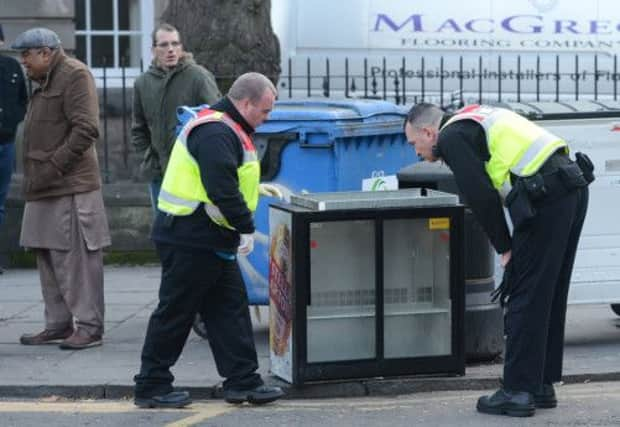Wardens to get police powers in anti-litter fight


Cleaning up litter in towns and cities across Scotland costs local authorities up to £53 million a year even though dropping waste items has been made an offence punishable by fines.
In many cases local authority wardens are unable to impose deterrent fines because they do not have the legal power to demand names and addresses from offenders.
Advertisement
Hide AdAdvertisement
Hide AdThe Scottish Government is now planning to amend legislation to give wardens the same powers as police officers – failure to give police officers identifying information is an offence in its own right. Studies have shown that anti-litter laws are most effective when wardens have been accompanied by officers with those powers.
Environmental health experts said Scotland had a poor record of littering behaviour that cost the country millions of pounds a year and enforcement of the law was the “best way” to make immediate improvements.
John Crawford, a past president of the Royal Environmental Health Institute Scotland (REHIS) and now an environmental consultant to councils, said: “The public don’t seem to understand or care about the fact that millions of pounds are spent each year dealing with litter. Anti-litter education is costly and has only limited effectiveness.
“Part of the problem is that people, unlike vehicles, carry no unique identification number. While it is an offence to refuse to give one’s correct name and address to a police officer, there is no similar offence for refusing to give one’s name and address – or providing a bogus name and address – to a council enforcement officer.
“This has meant that the only really successful enforcement of the litter legislation has arisen where enforcement staff have worked in tandem with community police officers, who ask the offender for name and address in earshot of the council officer.”
A survey carried out by campaigning agency Zero Waste Scotland (ZWS) this year found that despite the legislation authorising £50 fixed penalty notices, about 250 million items are being dropped annually. It also found that 50 per cent of Scots admitted to discarding litter despite millions of pounds being spent on anti-litter campaigns. ZWS calculated that cleaning up 15,000 tonnes of litter was costing councils £46m a year with a further £7m spent on enforcement.
A separate survey carried out by the Keep Scotland Beautiful charity last year found that litter levels beside more than half of the country’s major roads (57 per cent) were “unacceptable” and that more than two-thirds (71 per cent) were awash with confectionery and crisp wrappers thrown from moving vehicles.
Carole Noble, head of environmental services at the independent charity Keep Scotland Beautiful, said “irresponsible” littering had to be curbed.
Advertisement
Hide AdAdvertisement
Hide AdShe added: “A significant part of the solution to our national litter problem is proper enforcement of existing legislation and we support any new measure which allows enforcement personnel to take action against those who have dropped litter.
“With 70 per cent of people in Scotland indicating that they have seen someone dropping litter in the last three months, urgent action is required. Our Clean Up Scotland campaign is engaging huge numbers in cleaning up litter, but we all want to see the irresponsible litterers brought to book.”
Councillor Lesley Hinds, convener of Edinburgh City Council’s transport and environment committee, said surveys had shown litter to be one of the biggest bugbears of urban living.
She added: “Fifty per cent of people admit they throw litter on the ground and we have to change attitudes towards this. Giving wardens more powers is something we would endorse because police officers have many other issues to deal with. If people knew that wardens had these powers, then it might make them more careful about throwing litter down in the first place.”
A Scottish Government spokesman said stronger powers for council wardens would be part of a new nationwide anti-litter strategy to be introduced next year.
“We have announced our intention to bring in tougher fixed penalties of £80 from next April to establish a more effective deterrent,” he said.
“As another early action, the Scottish Government will propose using the Regulatory Reform Bill [currently progressing through the Scottish Parliament] to close the loophole in legislation to clarify that an alleged litterer commits an offence if they fail to give their name and address to a council warden.”